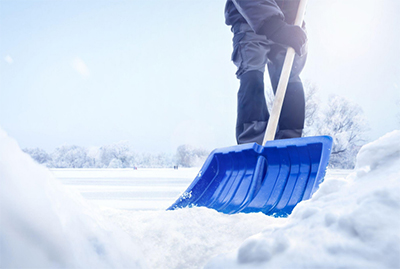
Shoveling snow is the inevitable chore that comes with living in snowy regions. Many people dread the thought of the snow making its way to their neighborhood because of this dreaded task. During the winter months, it’s no surprise that shoveling snow is one of the major causes of back injuries. Like all injuries, prevention is key, so follow these steps to ensure you stay safe and healthy.
- Warm up and Stretch: Shoveling is a form of exercise, so treat it that way! Warm up your muscles with some dynamic stretching and walking.
- Use Proper Technique: Keep your back in a neutral/straight position. Rounding your back can lead to injury. Use your legs as you lift the snow and avoid throwing the snow over your shoulder.
- Dress appropriately: Wear warm clothing that is loose enough to let you move freely. Make sure you have a winter coat that provides the warmth you need and boots have a good rubber sole with sufficient grip.
- Maintain a Healthy Diet: Protein and carbohydrates are essential for exercise. Make sure you are staying well hydrated and take water breaks as needed.
- Rest: Shoveling can take hours of hard work. Be sure to take breaks periodically as tired muscles are more prone to injury.
Injury prevention is what we aim for, but in the event that you do suffer from an injury, try these at-home treatments to bring you relief.
- Ice/Cold Therapy: Use an ice pack or a bag of frozen vegetables for the first 48 hours after the injury. Ice reduces swelling which helps minimize pain. Use it intermittently throughout the day.
- Heat Therapy: Use a heating pad, a hot water bottle, or a warm bath with Epsom salts. Heat will promote blood flow to muscles which helps in the healing process. Heat also relaxes sore, stiff muscles.
- Over-the-counter Pain Medications: NSAIDs such as naproxen and ibuprofen can help reduce pain and swelling. Acetaminophen is also a great option for pain relief.
- Rest: Rest can help alleviate sore, tired muscles. Resting for 30 minutes to an hour is sufficient; however, resting for hours at a time can cause muscle stiffness.
- Avoid Quick Movements: Avoid making any sudden movements that may cause pain. Try to avoid twisting, jumping, or any other quick movements.
- Stretching: Engage in slow, gentle, stretching that involves the lower back, legs, and hips. Stretching helps promote blood flow and improves range of motion.
If your back pain persists or worsens, it is recommended that you seek medical treatment to avoid any further injury. Call Dr. Chandra and make an appointment today!
Dr. Ramesh Chandra has been practicing orthopaedic surgery in the Washington DC Metropolitan area since 1984. The Center for Orthopaedics and Sports Medicine is easily accessed from anywhere in the Washington DC metropolitan area, with offices located in Falls Church, Reston/Herndon, and Tysons Corner.












